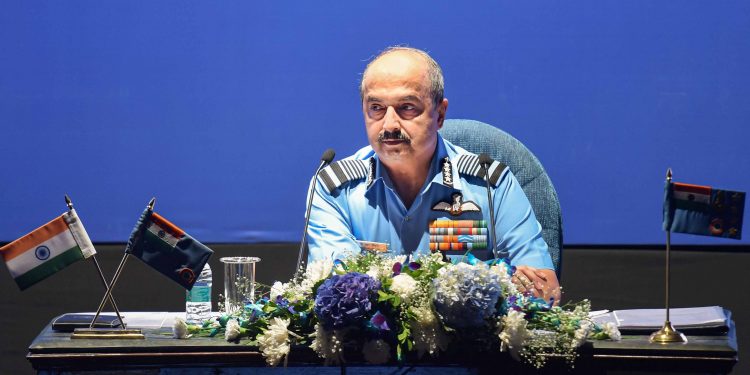New Delhi: Indian Air Force chief Air Chief Marshal V R Chaudhari Friday said the IAF is “fully aware” of the developments that are taking place across the northern borders and asserted that since the Galwan Valley crisis in 2020, the force is continuously upgrading its capabilities and changing tactics to be able to handle any threat.
At an event here, the IAF chief also said that three winters down the line, “we have created adequate infrastructure” and ensured “adequate deployment of all our assets” to have a “credible deterrence in that area”.
The Indian and Chinese troops are locked in an over-three-year confrontation in certain friction points in eastern Ladakh even as the two sides completed disengagement from several areas following extensive diplomatic and military talks.
The ties between the two countries nosedived significantly following the fierce clash in the Galwan Valley in June 2020 that marked the most serious military conflict between the two sides in decades.
“We are always on 24×7 readiness to take on any challenge. We are fully aware of the developments that are taking place across our northern borders. We keep a regular surveillance over what is happening there and our acquisition and deployment philosophy is always based to counter such kind of threats that are likely to emerge from there,” Air Chief Marshal Chaudhari said in response to a question on threat from China since the Galwan clash.
He said that after the Galwan crisis, the primary aim was to “enhance our surveillance in that area, to actually see what is happening across the border”.
“So, we had to deploy a large number of radar of all sizes in that area. We had to bolster it by deploying surface-to-air guided weapons. We had to redeploy our fighter aircraft,” he said.
The IAF chief was speaking during an interaction held at the Times Network’s India Economic Conclave.
Air Chief Marshal Chaudhari added that “we had taken all measures to ensure that our presence was felt, and it was in deterrence to the adversary”.
He shared that the primary issue that had hit the Indian side at that time was maintaining a steady logistics chain in such kind of a harsh environment.
“In 2020, we were sceptical how we will overcome the harsh winter. But three years down the line, three winters down the line, I think, we have created adequate infrastructure, we have ensured logistics supplies are available and adequate deployment of all our assets are there to have a credible deterrence in that area,” he said, when asked about India’s response since the 2020 crisis.
On handling any emerging Chinese threat, he said, “We are continuously upgrading our capabilities, and changing our tactics, techniques and procedures, to be able to handle the threat.”
Asked if there are any gaps in countering such threats, he said, gaps cannot be quantified, but those are being overcome with better tactics and technologies.
“There is always a counter” to what is happening across the border, he said.
On drone being used for nefarious intent, the IAF chief said, “We have already procured a large number of counter-drone system” and the force is working on bolstering its capabilities in this area.
Later, Navy Chief Admiral R Hari Kumar in a separate interaction said the Indian Navy is “combat ready, credible, cohesive and future-proof”.
He said the Navy deploys assets in a planned manner.
“And, whenever assets are deployed, they are fully combat-ready, that is they are ready to undertake a wide range of missions,” the Navy chief said.
In the interaction, he also spoke of the atmanirbharata (self-reliance) in Navy.
On a question on whether India needs for more aircraft carries, he said an aircraft carrier brings with it certain capabilities which no other assets can bring, and added that having a ceratin number of aircraft carriers in a country’s fleet is a matter of affordablity as well.
PTI






































